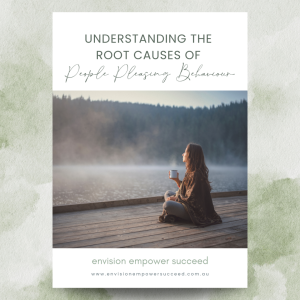People-pleasing might appear as harmless behaviour – after all, what’s wrong with wanting to make others happy? However, for those who identify as chronic people-pleasers, the habit often stems from much deeper, unresolved issues. It’s not just about being nice or helpful; it’s about prioritising others’ needs at the expense of your own, often to the point of emotional exhaustion or resentment. So, what drives this relentless desire to please?
Let’s explore the root causes of people-pleasing and uncover why so many struggle with this self-sacrificing habit.
1. Fear of Rejection
One of the most common roots of people-pleasing is the fear of being rejected or abandoned. This fear may develop from early life experiences, such as:
- Childhood neglect: When a child feels unloved or unnoticed, they may learn to seek approval to gain attention and affection.
- Social rejection: A history of being excluded or criticised can instil a deep fear of not belonging.
People-pleasers often believe that saying “no” or setting boundaries might result in others walking away, so they overcompensate to feel secure in their relationships.
2. Low Self-Worth
At its core, people-pleasing is often tied to a lack of self-worth. Many people-pleasers feel that their value is directly linked to what they do for others, rather than who they are. This belief can lead to:
- Constantly seeking validation from external sources.
- Measuring self-worth based on how much they help or please others.
Without a strong sense of self-worth, it’s easy to fall into the trap of prioritising others’ needs to feel valuable and accepted.
3. Trauma and Childhood Conditioning
Early life experiences play a significant role in shaping people-pleasing behaviours. These might include:
- Growing up in a strict or critical environment: Children raised in households with high expectations or emotionally unavailable caregivers may learn to please others as a way to avoid criticism or gain approval.
- Experiencing trauma: People who’ve endured emotional, physical, or psychological trauma may develop people-pleasing tendencies as a survival mechanism to avoid conflict or danger.
Over time, these coping mechanisms can become ingrained habits that persist into adulthood, even when the original threat no longer exists.
4. Cultural or Societal Expectations
Cultural norms and societal expectations often reinforce people-pleasing, particularly for women. Many cultures value traits like selflessness, nurturing, and compliance, creating pressure to:
- Always say “yes.”
- Avoid confrontation or disagreement.
- Put others’ needs first, even when it’s unhealthy.
This conditioning can leave people-pleasers feeling guilty when they attempt to prioritise themselves.
5. Conflict Avoidance
People-pleasers often dread confrontation or conflict. This aversion may stem from:
- A fear of upsetting others.
- A lack of confidence in asserting their opinions or needs.
To avoid discomfort, they might go along with what others want, even when it goes against their own preferences or values.
6. The Desire to Be Loved
At its heart, people-pleasing is often about love and connection. People-pleasers may equate pleasing others with being loved and accepted. They might think:
- “If I keep everyone happy, they’ll love me.”
- “If I say no, they won’t like me anymore.”
This creates a cycle of self-neglect, as they continually strive to meet others’ expectations to maintain relationships.
Breaking Free from People-Pleasing
Understanding the root causes of people-pleasing is the first step to breaking free from its hold. Healing these behaviours often involves:
- Building self-awareness: Recognising the patterns and triggers that drive your people-pleasing behaviour.
- Strengthening self-worth: Developing a sense of self that isn’t reliant on external validation.
- Setting boundaries: Learning to say “no” and prioritise your own needs without guilt.
- Seeking support: Working with a therapist or coach to heal underlying wounds and develop healthier relationship dynamics.
People-pleasing isn’t just about being agreeable; it’s often rooted in deep-seated fears, low self-worth, or past trauma. While it might feel like the only way to maintain relationships or feel valued, it’s a habit that often leads to burnout and resentment. By identifying and addressing the root causes, you can begin to break free from people-pleasing and reclaim your power to live authentically and confidently.
You deserve to put yourself first – not out of selfishness, but as an act of self-love. After all, true relationships are built on mutual respect and understanding, not self-sacrifice.
If you’re ready to break free from people-pleasing and build healthy boundaries, connect with me, a reformed people-pleaser turned life coach. Together, we can help you rediscover your worth and empower you to live authentically.








